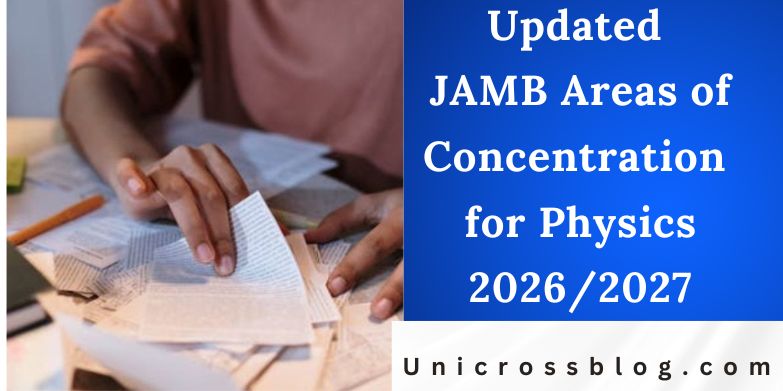The Joint Admissions and Matriculation Board (JAMB) examination is a critical step for students seeking admission into tertiary institutions in Nigeria. Physics, as a core science subject, plays a significant role in the Unified Tertiary Matriculation Examination (UTME) for science and engineering candidates. The JAMB Physics syllabus is designed to test candidates’ understanding of fundamental principles, their ability to apply these principles to real-world scenarios, and their problem-solving skills. This document outlines the key areas of concentration for Physics in the JAMB UTME, providing a comprehensive guide to help candidates prepare effectively. By focusing on these areas, students can streamline their study efforts, deepen their conceptual understanding, and improve their performance in the examination.
The Physics syllabus covers a broad range of topics, from mechanics to modern physics, ensuring candidates are well-versed in both theoretical and practical aspects of the subject. This guide expands on the critical areas of focus, offering clarity on what to expect and how to approach each topic.

JAMB Areas of Concentration for Physics
1. Mechanics
Mechanics is a foundational topic in Physics, dealing with the motion and interaction of objects. Key subtopics include:
-
Kinematics: Study of motion without considering forces, including concepts like displacement, velocity, acceleration, and equations of motion.
-
Dynamics: Newton’s laws of motion, forces, friction, and equilibrium of forces.
-
Work, Energy, and Power: Concepts of work done, kinetic and potential energy, conservation of energy, and power calculations.
-
Circular Motion and Gravitation: Uniform circular motion, centripetal force, and the law of universal gravitation.
-
Linear Momentum: Conservation of momentum, collisions (elastic and inelastic), and impulse.
Preparation Tip: Practice solving problems involving motion graphs, force diagrams, and energy transformations to build confidence in this area.
2. Heat and Thermodynamics
This section explores the behavior of heat and its interactions with matter. Key areas include:
-
Temperature and Heat: Measurement of temperature, heat transfer methods (conduction, convection, radiation), and specific heat capacity.
-
Gas Laws: Boyle’s, Charles’, and the general gas equation, as well as the kinetic theory of gases.
-
Thermodynamics: First and second laws of thermodynamics, heat engines, and entropy.
-
Thermal Expansion: Linear, area, and volume expansion of solids and liquids.
Preparation Tip: Focus on understanding the relationships between pressure, volume, and temperature in gas laws and practice calculations involving heat transfer.
3. Waves and Sound
Waves and sound cover the properties and behavior of wave motion. Key subtopics include:
-
Wave Motion: Types of waves (mechanical, electromagnetic), wave properties (frequency, wavelength, amplitude), and wave equations.
-
Sound Waves: Production, propagation, and characteristics of sound, including pitch, loudness, and the Doppler effect.
-
Reflection and Refraction: Behavior of waves at boundaries, including reflection, refraction, and diffraction.
Preparation Tip: Study wave diagrams and practice problems involving wave speed, frequency, and wavelength calculations.
4. Light and Optics
This section focuses on the properties and applications of light. Key areas include:
-
Reflection and Mirrors: Laws of reflection, plane and curved mirrors, and mirror formula.
-
Refraction and Lenses: Snell’s law, refractive index, critical angle, total internal reflection, and lens formula.
-
Optical Instruments: Function and operation of instruments like microscopes, telescopes, and cameras.
Preparation Tip: Practice ray diagrams for mirrors and lenses and understand the application of the lens and mirror formulas.
5. Electricity and Magnetism
Electricity and magnetism are crucial topics that explore the behavior of electric and magnetic fields. Key subtopics include:
-
Electrostatics: Coulomb’s law, electric fields, and potential difference.
-
Current Electricity: Ohm’s law, resistors in series and parallel, and electrical power.
-
Magnetism: Magnetic fields, properties of magnets, and electromagnetic induction.
-
Electromagnetic Waves: Properties and applications of electromagnetic waves.
Preparation Tip: Focus on circuit analysis, including calculating equivalent resistance and understanding electromagnetic induction principles.
6. Modern Physics
Modern physics introduces advanced concepts that form the basis of contemporary scientific developments. Key areas include:
-
Atomic Structure: Models of the atom, including Bohr’s model and quantum theory.
-
Nuclear Physics: Radioactivity, nuclear reactions, and applications of nuclear energy.
-
Photoelectric Effect: Einstein’s explanation, work function, and applications in devices like solar cells.
Preparation Tip: Understand the principles behind radioactivity and practice problems involving half-life and the photoelectric effect.
7. Measurements and Units
This foundational topic covers the tools and techniques used in physics experiments. Key areas include:
-
Fundamental and Derived Units: SI units, dimensions, and unit conversions.
-
Measurement Techniques: Use of instruments like vernier calipers, micrometers, and stopwatches.
-
Errors and Accuracy: Types of errors (systematic and random) and precision in measurements.
Preparation Tip: Practice unit conversions and familiarize yourself with the use of measuring instruments to minimize errors.
READ ALSO: Approved JAMB CBT Centres in Cross River State 2026/2027
FAQs
What is the structure of the JAMB Physics exam?
The JAMB Physics exam consists of multiple-choice questions, typically 40 in number, covering all areas of the syllabus. Questions test both theoretical knowledge and problem-solving skills, requiring candidates to apply concepts to practical scenarios.
How much time should I allocate to studying Physics for JAMB?
The time required depends on your current knowledge level. On average, dedicate 2–3 hours daily over 3–6 months, focusing on understanding concepts, solving past questions, and revising weak areas.
Are calculators allowed in the JAMB Physics exam?
No, calculators are not permitted in the JAMB UTME. Candidates must rely on mental calculations and simplified problem-solving techniques. Practice manual calculations to improve speed and accuracy.
How can I improve my problem-solving skills in Physics?
-
Solve past JAMB questions to familiarize yourself with the question format.
-
Break down complex problems into smaller parts.
-
Practice numerical problems regularly, focusing on units and significant figures.
-
Study with peers to discuss and solve challenging questions.
Which topics in the Physics syllabus are most important?
While all topics are important, mechanics, electricity, and optics often carry significant weight in the exam. However, modern physics and thermodynamics are increasingly emphasized, so ensure balanced preparation.
How can I manage time during the Physics exam?
-
Allocate about 1–2 minutes per question, depending on the total time for the exam.
-
Skip difficult questions initially and return to them later.
-
Read questions carefully to avoid misinterpretation.
What resources are best for preparing for JAMB Physics?
-
Use the official JAMB Physics syllabus to guide your study.
-
Study textbooks like New School Physics by M.W. Anyakoha or Senior Secondary Physics by P.N. Okeke.
-
Practice with JAMB past question booklets and CBT software for a realistic exam experience.
How do I handle theoretical questions in Physics?
For theoretical questions, focus on definitions, laws, and principles. Use mnemonics to recall key concepts and practice explaining them in simple terms to ensure clarity.
What are common mistakes to avoid in the JAMB Physics exam?
-
Neglecting units in calculations, which can lead to wrong answers.
-
Rushing through questions without understanding them fully.
-
Ignoring negative signs or significant figures in numerical problems.
-
Overlooking diagrams or graphs provided in questions.
Can I pass JAMB Physics without a teacher?
Yes, with self-discipline and the right resources, you can prepare effectively. Use textbooks, online videos, and study groups to clarify difficult concepts. Consistent practice and revision are key.







